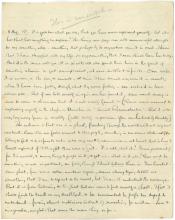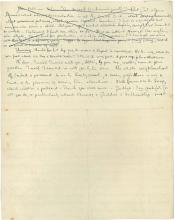BRACERS Record Detail for 18685
To access the original letter, email the Ready Division.
"It is quite true what you say, that you have never expressed yourself—but who has that has anything to express?"
[Continues] "Thursday" = 15(?) Aug. 1918.
There is a transcription of this letter, document .007052-f6, pp. 584-5, record 93484.
Letter 66
BR TO OTTOLINE MORRELL, 11–15 AUG. 1918
BRACERS 18685. ALS. Texas. Auto. 2: 90
Previous Brixton letter, BRACERS 131590; next letter, BRACERS 55846
Edited by K. Blackwell, A. Bone, N. Griffin and S. Turcon
<Brixton Prison>1
11 Aug. ’18.
It is quite true what you say, that you have never expressed yourself2 — but who has that has anything to express? The things one says are all unsuccessful attempts to say something else — something that perhaps by its very nature cannot be said. I know that I have struggled all my life to say something that I never shall learn how to say. And it is the same with you. It is so with all who spend their lives in the quest of something elusive and yet omnipresent, at once subtle and infinite. One seeks it in music, and the sea, and sunsets — at times I have seemed very near it in crowds,3 when I have been feeling strongly what they were feeling — one seeks it in love above all. But if one lets oneself imagine one has found it, some cruel irony is sure to come and show one that it is not really found. — I have come nearest to expressing myself in the chapter on Education in Social Reconstruction.4 But it is a very long way from a really full self-expression. You are hindered by timidity.a
The outcome is that one is a ghost, floating through the world without any real contact. Even when one feels nearest to other people, something in one seems obstinately to belong to God and to refuse to enter into any earthly communion — at least that is how I should express it if I thought there was a God. It is odd, isn’t it? I care passionately for this world, and many things and people in it, and yet … what is it all? There must be something more important, one feels, though I don’t believe there is. I am haunted — some ghost, from some extra-mundane region, seems always trying to tell me something that I am to repeat to the world, but I cannot understand the message. But it is from listening to the ghost that one comes to feel oneself a ghost.5 I feel I shall find the truth on my deathbed and be surrounded by people too stupid to understand — fussing about medicines instead of searching for wisdom. Love and imagination, mingled: that seems the main thing so far.
You tell meb I have “the secret of eternal youth”.6 But God alone knows what intensity of resolution is at the back of it — what despair surmounted, what weariness put away, what cynicism repressed. Sometimes I feel so infinitely old that every one else seems a child. 30 years ago I reached absolute despair,7 except that I wanted to work — I believed I had something to do. It is an instinct stronger than anything else at all, the instinct for production, or is it for self-expression? It has kept me alive all this time, and artificially young. I suppose the vigour that keeps me going is really young, but it is so much a matter of will.
Thursday. Thanks for Lit Sup. Yes, the review of Rupert is excellent.8 By the way, what do you feel about Ka Cox and Arnold Foster?9 I think it very good: it gives scope for her motherliness.
Oh dear, I wish I were with you, sitting by your ilex, walking round your garden. I wish I could be with you by the sea. The whole neighbourhood of Oxford is poisoned to me by Bagley Wood,10 and seeing people there is only a tenth of the pleasure of seeing them elsewhere. I look forward to the soap, which will be a godsend. Thank you 1000 times. — Goodbye. I am grateful for all you do, and particularly about Murray and Geddes and Fellowship.
Your
B.
- 1
[document] “This is wonderful —”. (O. Morrell’s note at the top of the sheet.) The letter was edited from a digital scan of the initialled, handwritten original in the Morrell papers at the University of Texas at Austin. The sheet was folded twice. The letter was extracted in BR’s Autobiography, 2: 90.
- 2
what you say ... never expressed yourself “I have never half expressed myself in life — I know and I don’t think I shall ever be able to — but perhaps the memory of one’s spirit will stir something in others that would satisfy one” (Ottoline to BR, 30 July 1918, BRACERS 114752).
- 3
at times I have seemed very near it in crowds BR reflected on this much later: “Throughout my life I have longed to feel that oneness with large bodies of human beings that is experienced by the members of enthusiastic crowds. The longing has often been strong enough to lead me into self-deception” (Auto. 2: 38).
- 4
chapter on Education in Social Reconstruction I.e., in Principles of Social Reconstruction (1916). Continuing to think well of it, BR later chose this chapter for his Selected Papers (New York: Modern Library, 1927).
- 5
ghost … ghost … one comes to feel oneself a ghost By this BR meant the feeling of being “superfluous”, of “looking on but not participating” (as he wrote to Ottoline, BRACERS 18494; Auto. 2: 54). He recalled the feeling when he came to write his Autobiography. Even on Armistice Day — which occurred two months after his release from Brixton — he “felt strangely solitary amid the rejoicings, like a ghost dropped by accident from some other planet” (2: 38). See Letter 75, in which BR described the origin of his sense of being a ghost in response to Ottoline’s reaction to the current letter.
- 6
You tell me I have “the secret of eternal youth” Ottoline had written BR: “So delighted to hear of your New Ideas in Philosophy — ‘The Fountain of Eternal Youth’ ought to be your Name” (July 1918, BRACERS 114750).
- 7
30 years ago I reached absolute despair BR was surely referring to the eighteen months he spent as a student at B.A. Green’s University and Army Tutors, in Southgate, London. He attended this “Army crammer”, as he unflatteringly remembered the institution (Auto. 1: 42), in preparation for the Trinity College scholarship examination, which he sat in December 1889. In a deleted passage in another later writing, “The Importance of Shelley” (1957), BR recalled his reaction to the young men there: “Until I went to Cambridge, most of my contemporaries whom I knew filled me with disgust, so that my love of the human species was tempered by loathing of most of the examples I came across” (Papers 29: 586–7). Gradually, he said, he “got used to their conversation and ceased to be shocked by it. I remained profoundly unhappy.… I did not, however, commit suicide, because I wished to know more of mathematics” (Auto. 1: 43). Much later, in 1959, BR was asked, “What was your worst period of unhappiness?” He replied: “Well I was very, very unhappy in adolescence. I think many adolescents are. I had no friends, nobody I could talk to. I thought that I was contemplating suicide all the time and was restraining with difficulty from this act and this was not really true” (Bertrand Russell Speaks His Mind (Cleveland and New York: World, 1960), p. 71. Compare the cognate topic in Letter 95 (also to Ottoline), note 18 on “the worst time of my life”.
- 8
Lit. Sup. … review of Rupert is excellent The (anonymous) review of The Collected Poems of Rupert Brooke; with a Memoir, edited by Edward Marsh (London: Sidgwick & Jackson, 1918), was by Virginia Woolf: “Rupert Brooke”, The Times Literary Supplement, 8 Aug. 1918, p. 371. Like BR, Woolf had known Brooke and wrote appreciatively of him as a person. Marsh’s lengthy memoir of the poet concluded with a tribute to him from Winston Churchill (previously published in The Times), which BR — appalled as he was by the loss of men such as Brooke in a futile war — must have regarded as especially loathsome: “Joyous, fearless, versatile, deeply instructed, with classic symmetry of mind and body, he was all that one would wish England’s noblest sons to be in days when no sacrifice but the most precious is acceptable, and the most precious is that which is most freely proffered” (Collected Poems, p. clix).
- 9
what do … Ka Cox and Arnold Foster? Before the war, as a student at Cambridge, Katherine (“Ka”) Laird Cox (1887–1938) had been one of the group of “Neo-Pagans” around Rupert Brooke — with whom she fell in love. In September 1918 she married William Arnold-Forster (1885–1951), a painter and a member of the Royal Naval Reserve. Ottoline agreed with BR’s assessment of the match (17 Aug. 1918, BRACERS 14755).
- 10
Bagley Wood BR lived at Bagley Wood, Oxford, from 1905 to 1910 with his first wife, Alys. See S. Turcon, “Bagley Wood”, Bertrand Russell Society Bulletin, no. 149 (Spring 2014): 19–22. His marriage was by that time a sham. He wrote in his Autobiography: “The strain of unhappiness combined with very severe intellectual work [on Principia Mathematica] … was very great” (1: 152).
- a
I have come … timidity. These sentences are in parentheses, and appear to have been added later for Ottoline’s typed selection of BR’s letters to her. The parentheses are retained in his Autobiography.
- b
You tell me This paragraph has eight lines drawn through it at different angles. It is not BR’s style of deletion; the paragraph is therefore retained.


